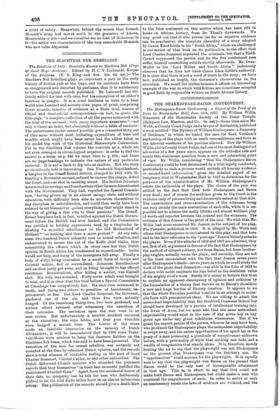THE SLACHTERS NEK REBELLION.
The Rebellion of 1815: Genero2ly Known as Slachters Nek (Cape of Good Hope Archives). Edited by H. C. V. Leibrandt, Keeper of the Archives. (P. S. Xing and Son. 10s. 6d. net.)—The Slachters Nek Rebellion plays so important a part in the early history of British rule at the Cape, and its incidents have been so exaggerated and distorted by partisans, that it is satisfactory to have the original records published. Mr. Leibrandt has evi- dently edited his text with care, but his conception of an editor's function is meagre. It is a cruel kindness to issue to a busy world nine hundred and seventy-nine pages of print, comprising Court records, minutes of evidence at a State trial, masses of official and demi-official correspondence—in fact, to quote the title-page, "a complete collection of all the papers connected with the trial of the accused; with many important annexures "—not only without an index, but absolutely without a table of contents! The unfortunate reader cannot possibly get a connected story out of this maze without most irritating expenditure of time and trouble, which might have been saved had the editor taken as his model the work of the Historical Manuscripts Commission. For in the Slachters Nek volume the contents as a whole are not even arranged in chronological sequence : in order to find the answer to a letter on p. 833 we must turn to p. 884; and there are no page-headings to indicate the nature of any particular material. It is not a book to dip into at random. But the story so circuitously told is interesting. One Frederich Bezuidenhout, a burgher in the Graaff-Reinet district, charged in 1815 with ill- treating a Hottentot servant, refused to answer the charge, defied the Court, and was shot in resisting arrest. His brother Johannes determined on revenge, and found certain other farmers discontented with the Government. They had, reported the Special Commis- sion, "having grown up in an almost savage state, and without education, with difficulty been able to accustom themselves to any discipline or subordination, and could thus easily have been seduced to set themselves -gainst everything that might stand in the way of giving a free rein to their passions." The Graaff- Reinet burghers had, in fact, rebelled against the Dutch Govern- ment before the British had ever landed, and the Commission was justified in holding expressions used by a ringleader in- dicating "a so-called attachment to the Old Motherland of Holland" "as nothing else than a mere pretext." At any rate, some two hundred Dutch colonists rose in armed rebellion, and endeavoured to secure the aid of the Kaffir chief Gaika, thus committing the offence which, in every case but this, Dutch opinion in South Africa has condemned as unpardonable. Gaika would not help, and many of the insurgents fell away. Finally a body of sixty, being overtaken by a small force of troops and Colonial militia, fled or surrendered. Johannes Bezuidenhout and another party got away, and on being brought to bay offered resistance. Bezuidenhout, after killing a soldier, was himself shot. His wife was wounded. Forty-seven rebels were brought . to trial, and it is clear that the trial before a Special Commission at Lritenhage was scrupulously fair. Six men were sentenced to death, and thirty-two others to penalties of banishment, im- prisonment, or fine. But Lord Charles Somerset, the Governor, pardoned one of the six, and thus five were actually hanged. Of the remaining thirty-two, two were pardoned, and sixteen others released after witnessing the execution of their comrades. The sentences upon the rest were in no case severe. But unfortunately a terrible accident occurred at the execution: the rope broke, and four poor wretches were hanged a second time. The horror of the scene made an indelible impression on the memory of Dutch Afrikanders ; it will be remembered that in 1896 some Trans- vaal Boers were anxious to hang the Jameson Raiders on the Slachters Nek beam, which was said to have been preserved. The execution of five men for armed rebellion was certainly not resented at the time by educated Dutch opinion, and the records show a total absence of vindictive feeling on the part of Lord Charles Somerset, Colonel Cuyler, or any other authorities. The
Dutch Reformed Church minister who attended the prisoners reports that they themselves "in their last moments justified the punishment awarded them." Apart from the accidental horror of their fate, no sympathy can be felt for men who deliberately plotted to let the wild Kaffir tribes loose on an almost defenceless colony. The publication of the records should give a death-blow
to the false sentiment on this matter which has been rife in books on African history, from Dr. Thears downwards. We may point out that it also proves (as far as negative evidence can be conclusive) the complete absurdity of a story adopted by Canon Knox Little in his "South Africa," which we challenged in our review of that book on its publication, to the effect that Lord Charles Somerset reprieved the criminals, but that a Field. Cornet suppressed the pardon and let the five condemned men suffer, himself committing suicide shortly afterwards. Mr. Iwan- Muller in his "Lord Milner and South Africa" judiciously observes that he does not know Canon Knox Little's authority. It is clear that there is not a word of truth in the story ; we have now, published at length, the Governor's observations on the execution. We recall the matter because it affords an interesting example of the way in which wild fictions are sometimes accepted in good faith by responsible writers on South African history.


























































 Previous page
Previous page